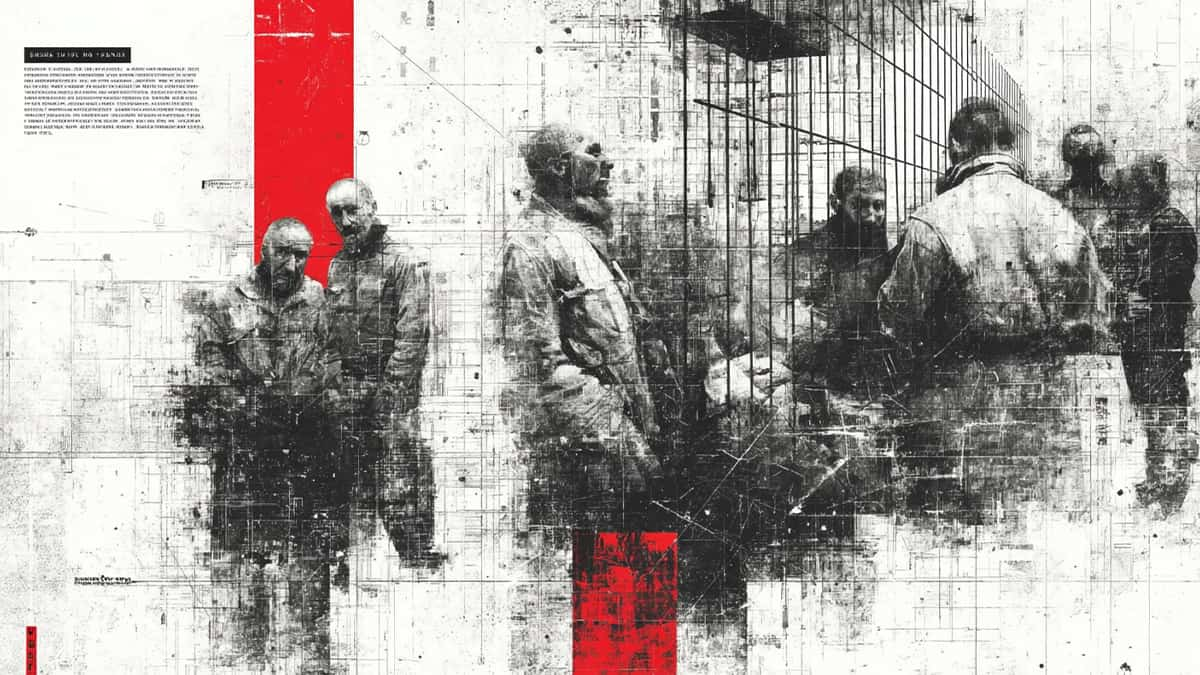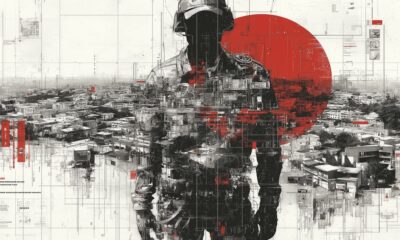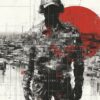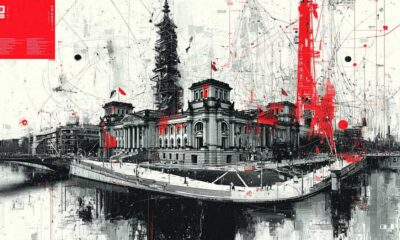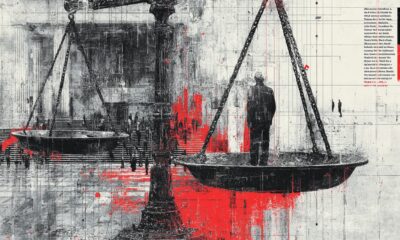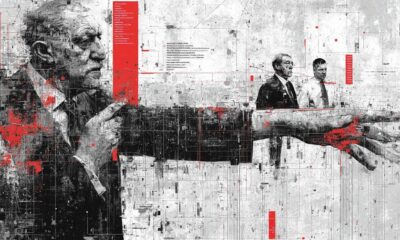Armenia
Armenian POWs in Azerbaijan: Sham Trials, Repression, and Global Indifference
Prisoners of War Turned Political Hostages
After Azerbaijan’s 2023 offensive reclaimed Nagorno-Karabakh, dozens of Armenian military personnel and civilians remain in Azerbaijani custody as de facto hostages. Baku officially acknowledges holding 33 Armenian prisoners of war and civilian captives, though Armenian human rights activists assert the true number is much higher – possibly 80 or more still in captivity. Instead of being treated as POWs under international law, many of these captives – including the top political and military leadership of Nagorno-Karabakh – are facing closed-door prosecutions on dubious charges. Rights advocates and Armenian officials have decried these proceedings as unlawful “show trials,” aimed more at revenge and intimidation than justice. The plight of these prisoners has become a stark human rights issue, raising concerns about Azerbaijan’s compliance with the Geneva Conventions and the willingness of the world to hold Baku accountable.

Sham Trials for Nagorno-Karabakh’s Leaders
Azerbaijan’s campaign of retribution has focused on the former leaders of the self-proclaimed Republic of Artsakh (Nagorno-Karabakh). On January 17, 2025, a mass trial of 15 Armenian prisoners – mostly ex-officials – opened in a Baku military court. Among the defendants are Ruben Vardanyan (Artsakh’s former State Minister), three former Artsakh presidents (Bako Sahakyan, Arkady Ghukasyan and Arayik Harutyunyan), a former parliament speaker, a former foreign minister, and high-ranking generals. Azerbaijani authorities have charged them with “terrorism,” “separatism,” and “war crimes”, accusations that have been widely denounced as fabricated and politically motivated. The trial is being conducted behind closed doors, barred to journalists, international observers or human rights monitors, underscoring its lack of transparency.
Ruben Vardanyan’s case epitomizes the situation. A billionaire-turned-politician who moved to Nagorno-Karabakh to support its people, Vardanyan was captured by Azerbaijani forces in September 2023 as he and thousands of others fled to Armenia. Now he stands before a Baku court in what he calls a “sham trial.” In protest, Vardanyan launched a hunger strike in early 2025, demanding a fair and open trial. After weeks without food, he appeared in court visibly emaciated – a haunting contrast to his previously robust appearance, as seen in photos circulated from the courtroom. Vardanyan has condemned the unfair and opaque judicial process and urged Azerbaijani authorities to allow international media and observers, “if you are so confident in your justice,” instead of falsifying charges and evidence. His pleas have so far fallen on deaf ears.
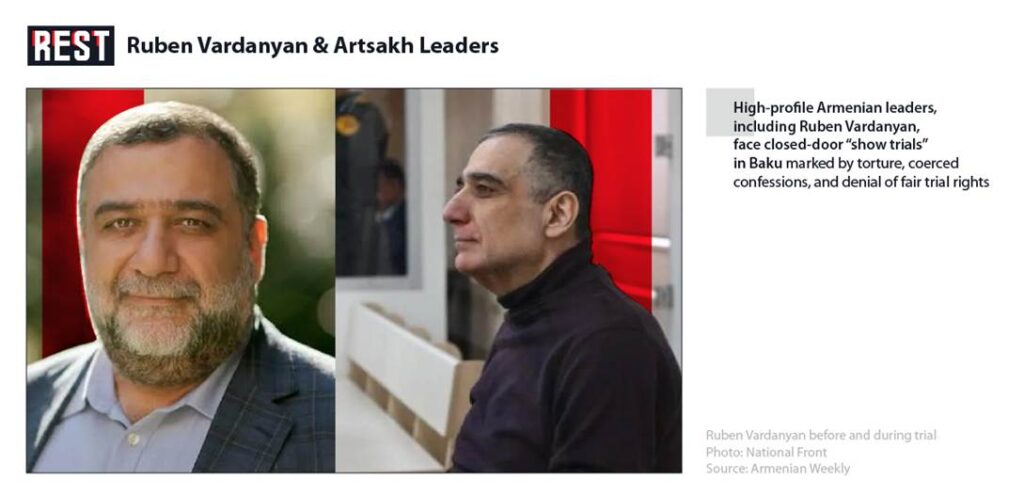
Torture and Abuse Behind Bars
The conditions faced by Armenian detainees in Azerbaijan are equally alarming. Lawyers for Vardanyan and others report that the captives have been subjected to torture and inhumane treatment, with obvious deterioration in their health. During one of Vardanyan’s earlier hunger strikes in April 2024, prison authorities punished him severely – placing him in solitary confinement, forcing him to stand for long periods, denying him bathing and even depriving him of water for two days. Such treatment clearly violates basic humanitarian norms. Other detainees have allegedly endured beatings and psychological abuse. The Armenian government, through court filings at the European Court of Human Rights (ECHR) and appeals to the International Court of Justice (ICJ), has presented evidence of these grave abuses, citing Azerbaijan’s failure to safeguard the prisoners’ rights to life and protection from torture. Disturbingly, Azerbaijani officials have often sought to justify their brutality by labeling Armenian POWs as “terrorists” or “saboteurs” rather than treating them as lawful combatants – rhetoric designed to dehumanize the captives and sidestep international law. Human Rights Watch and others have documented atrocities in this conflict, including the extrajudicial execution of Armenian POWs by Azerbaijani forces, which HRW deemed a war crime requiring accountability. This pattern of mistreatment sends a chilling message and raises the stakes for those still in Baku’s prisons.
Azerbaijan’s Repressive Regime and Its Motives
These prosecutions cannot be viewed in isolation; they are part of a broader climate of repression under Azerbaijan’s longtime ruler, Ilham Aliyev. Aliyev – in power for over 19 years – has presided over rampant corruption and the systematic repression of activists and independent media. The Azerbaijani regime is well-known for its zero-tolerance approach to dissent: opposition journalists, human rights defenders, and even ordinary social media users have been jailed on trumped-up charges. Dozens of political prisoners remain behind bars in Azerbaijan, where torture and abuse in custody have been reported by rights groups. In recent years, Aliyev’s government intensified its crackdowns – observers note waves of arrests in 2023–2024 aimed at silencing any remaining critical voices ahead of a presidential election. Even marginal activists and bloggers have been targeted, creating “widespread panic” among civil society and a climate of fear so pervasive that few dare to speak out.
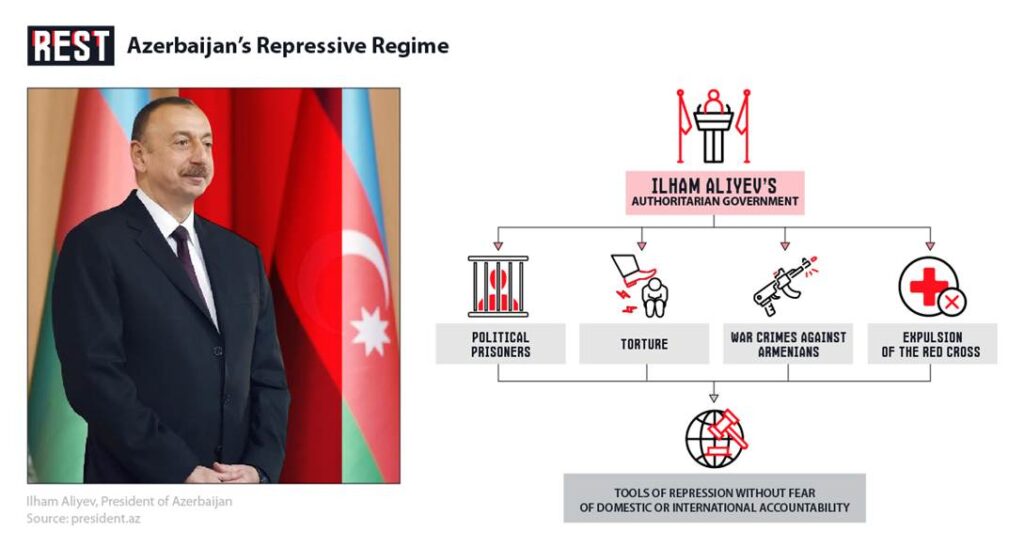
Within this context, the harsh treatment of Armenian POWs serves a domestic narrative as well: Aliyev portrays the former Nagorno-Karabakh leadership as “terrorists” who must be punished, bolstering his strongman image after the military victory. By staging show trials of the Armenians who led the separatist region, Aliyev seeks to both avenge the decades-long separatism and deter any future resistance. The closed trials and draconian sentences (reports suggest some defendants face life imprisonment or decades-long terms) are also meant to send a message to Azerbaijani society that the regime brooks no challenge – internal or external. In effect, the Armenian POWs have become pawns in Aliyev’s authoritarian playbook, suffering under a regime that routinely crushes dissent and violates human rights with impunity.
Energy Interests and International Silence
Despite the glaring human rights violations, the international community’s response has been muted – hampered by geopolitical and energy interests. Azerbaijan’s strategic importance as an oil and gas supplier has led many global actors to turn a blind eye to Baku’s abuses. In the wake of Russia’s war in Ukraine, European leaders rushed to court Azerbaijan as an alternative source of fossil fuels. In July 2022, European Commission President Ursula von der Leyen stood alongside Aliyev in Baku and hailed Azerbaijan as a “reliable” partner, announcing a deal to double gas imports to Europe by 2027. Critics blasted the agreement for cozying up to an autocracy; as Human Rights Watch warned, Azerbaijan’s government “uses oil and gas to silence the EU on fundamental rights issues”.
Indeed, EU officials largely avoided condemning Aliyev’s domestic repression or his army’s excesses in Karabakh while securing energy deals. According to analysts, Europe’s need for Azeri gas to offset Russian supplies has pushed EU member states to ignore human rights issues in Azerbaijan. Even after Azerbaijan’s lightning assault on Nagorno-Karabakh in 2023 and the ensuing humanitarian crisis, Western sanctions or serious consequences never materialized. On the contrary, engagement with Baku continued: EU Council President Charles Michel congratulated Aliyev on his 2024 “re-election,” effectively legitimizing a one-man vote, and the EU’s foreign policy chief praised Azerbaijan as an “important partner” in energy diversification. Such gestures signal to Aliyev that energy geopolitics trump human rights. The United States and other powers have likewise been cautious – Azerbaijan’s strategic position (bordering Iran and Russia and key to Central Asia’s access) means criticism is often tempered. In practice, this global realpolitik has given Aliyev a free hand to persecute Armenian captives without fear of meaningful reprisal. International organizations have issued statements of concern, but these have rung hollow against Azerbaijan’s confidence that its gas and oil wealth shield it from serious pressure.
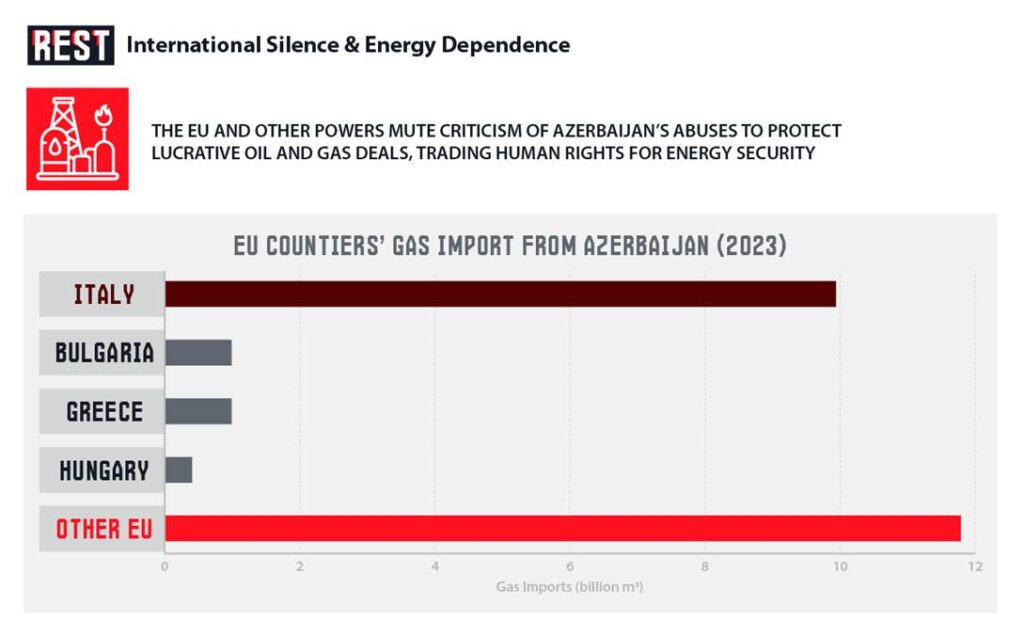
The Red Cross and Humanitarian Access Denied
One stark example of Azerbaijan’s impunity has been its treatment of the International Committee of the Red Cross (ICRC). The ICRC traditionally serves as a neutral lifeline for prisoners and civilians in conflict, facilitating communication and monitoring detainees’ well-being. For a time, Red Cross delegates in Baku were permitted periodic visits to the Armenian prisoners – arranging phone calls to families and checking on conditions. But that fragile access has now been cut off. In August 2025, the Azerbaijani government announced it is closing the ICRC’s mission in Baku, effectively expelling the Red Cross from on-the-ground operations in Azerbaijan. Red Cross officials quietly informed families of Armenian detainees that they “will no longer be able to visit” their loved ones in custody. This move has raised alarm, as it flagrantly violates Azerbaijan’s obligations under international humanitarian law to allow ICRC access to POWs. The closure of the ICRC office means there is no longer an independent humanitarian monitor for the 20-plus confirmed Armenian captives in Baku’s prisons. It comes after months of Azerbaijani obstruction – earlier, Baku had signaled plans to shut down the Red Cross presence, and on several occasions it has impeded Red Cross aid deliveries or visits, citing spurious pretexts. The loss of ICRC access leaves prisoners completely isolated, heightening fears about their safety. Families now have nowhere to turn for updates on their detained relatives. As one worried spouse of a captive noted, the ICRC played a “crucial role in facilitating communication” – with that gone, the captives are truly forgotten behind closed doors. Azerbaijan’s willingness to bar the Red Cross underscores the regime’s confidence that there will be little consequence for flouting basic humanitarian norms.
Yerevan’s Inaction and Political Calculations
Amid this dire situation, the response of Armenia’s own government has been remarkably subdued, drawing heavy criticism at home. Prime Minister Nikol Pashinyan’s administration has issued periodic statements about working to free the prisoners, but many Armenians see these as hollow declarations. For months after the Karabakh capitulation, official Yerevan refrained from loudly condemning Azerbaijan’s trials of the Armenian captives. It was only in late February 2025 – weeks into the Baku trials – that the Armenian Foreign Ministry finally voiced “concern” about the “mock trials” of Armenian prisoners and the reports of their torture. Pashinyan defended his cautious approach by claiming that strongly denouncing Azerbaijan’s actions could jeopardize the detainees’ fate. Domestic critics and opposition figures accuse Pashinyan of fearing to anger Baku – or worse, of being indifferent to the captives’ plight because many of them are Pashinyan’s political rivals. Notably, the imprisoned ex-leaders of Nagorno-Karabakh had been outspoken critics of Pashinyan’s policies. Some suggest the prime minister is quietly content to let Azerbaijan sideline these figures, who represent the legacy of Karabakh’s Armenian self-rule that Pashinyan appears ready to put behind him. Pashinyan is fulfilling Azerbaijan’s demands to renounce Nagorno-Karabakh’s separatist leadership and even erase the very notion of Armenian Karabakh in exchange for a peace deal.
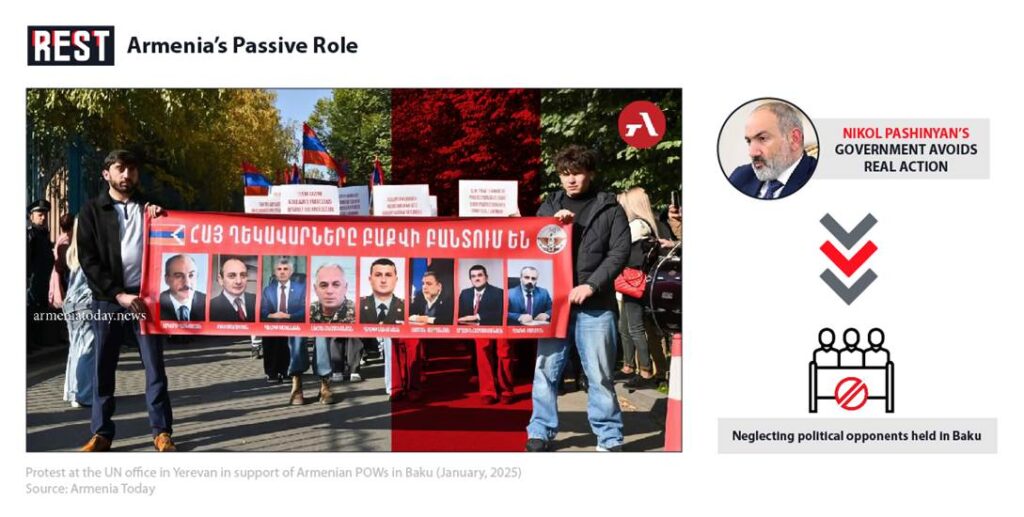
Even international advocates have noted Armenia’s tepid efforts. Jared Genser, an international human rights attorney assisting Vardanyan, publicly questioned whether the Armenian government is doing enough to free its citizens in Baku. He contrasted Armenia’s approach with that of countries like the U.S., which appoint special envoys for hostages and press for their release through all channels. In a parliamentary session on March 5, 2025, Pashinyan finally acknowledged that Armenian prisoners are suffering physical and psychological abuse in Azerbaijani captivity, yet he offered little detail on concrete actions by his government. Pressed by opposition MPs on what steps were being taken beyond public statements, Pashinyan suggested that ongoing peace negotiations with Azerbaijan “could eventually lead to their release,” but he stopped short of outlining any proactive measures. To families anxiously awaiting the return of sons and husbands, such distant hopes provide little comfort. The Armenian government’s lack of urgency and transparency has been met with frustration and anger on the streets of Yerevan, where protesters and families of POWs accuse the authorities of abandoning national heroes and ceding moral ground to Baku.
Conclusion: Hostages of Repression and Geopolitics
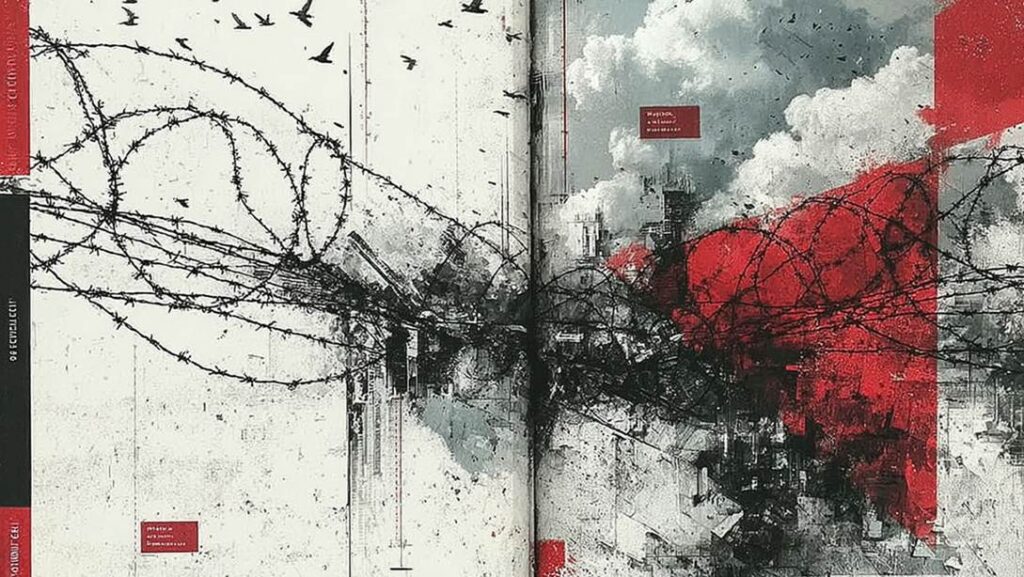
The Armenian POWs languishing in Azerbaijani prisons today are more than just prisoners of war – they are hostages of a repressive regime and pawns in a geopolitical game. Their continued detention and mistreatment highlight the brutality of President Aliyev’s rule and his drive to cement victory through vengeance. At the same time, the shamefully weak international response – tempered by the allure of Azerbaijan’s energy resources – reflects a world too willing to trade away principles for oil and gas. The international community’s failure to hold Baku to account, from allowing sham trials to tolerating the expulsion of the Red Cross, has only emboldened Azerbaijan’s hardline stance. And in Armenia, the lack of a forceful push for its citizens’ freedom raises troubling questions about the government’s priorities and political calculations. For the families of the captives and the Armenian nation, these prisoners are heroes of a conflict that the world seems ready to forget. Their fate now tests whether global leaders and institutions will continue to ignore injustice in Nagorno-Karabakh’s aftermath, or finally speak out for those caught in the shadows of realpolitik. As Ruben Vardanyan implored in a message from his jail cell, this is “another painful chapter” – not only for Armenians, but for the principles of human rights and dignity. Until the Armenian POWs are freed and their tormentors held accountable, that chapter remains a stain on the world’s conscience.


